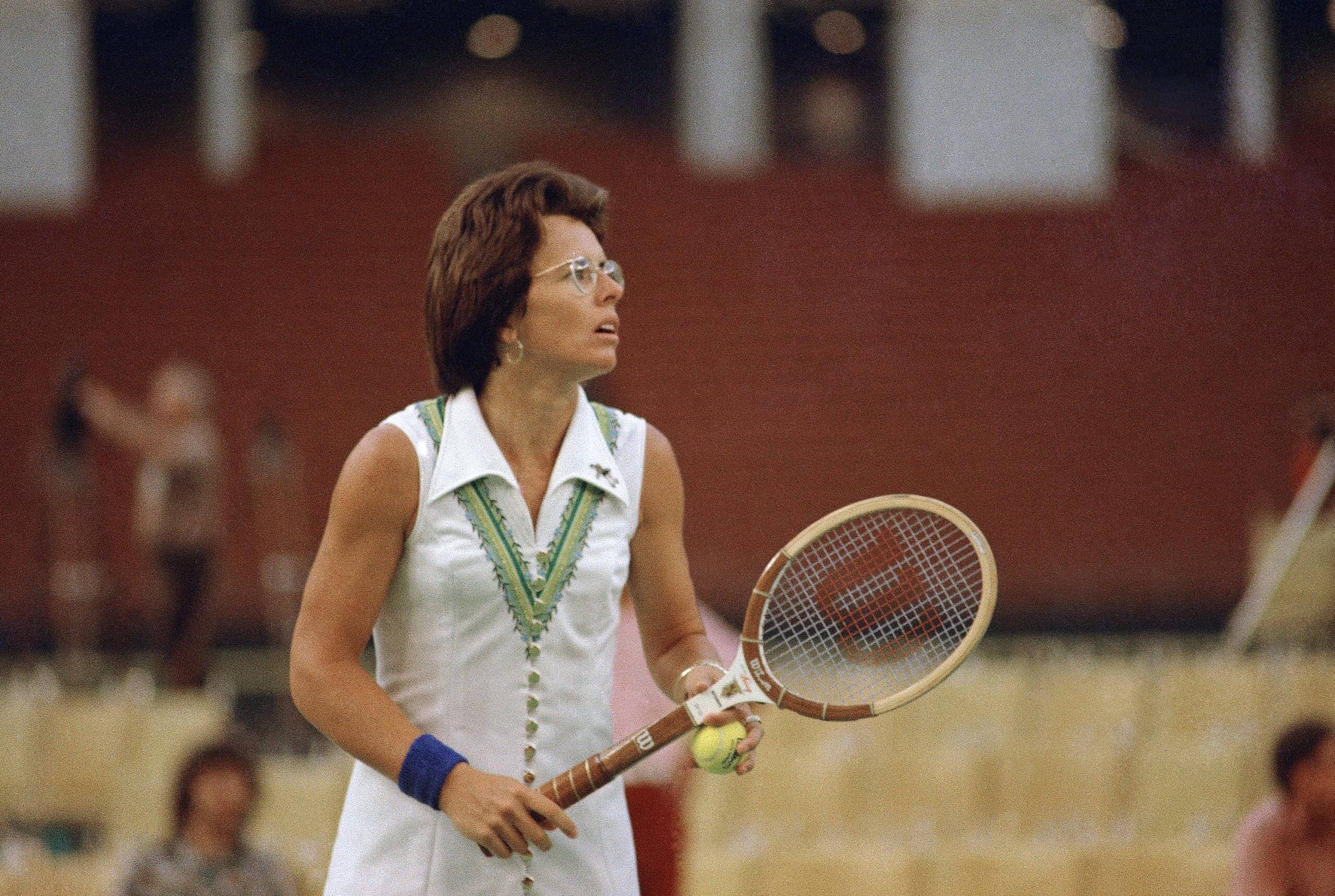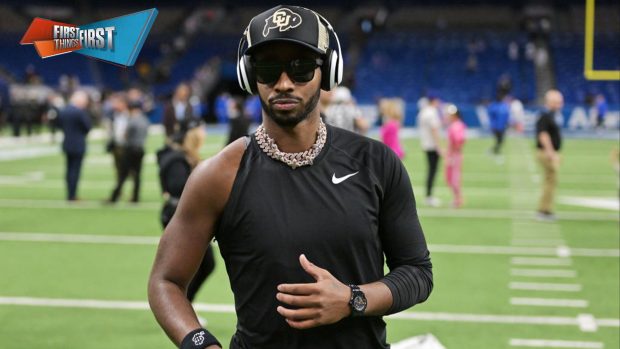
LOS ANGELES — Billie Jean King can work a room like few others in women’s sports.
It is no different at the SheBelieves Summit in Los Angeles, as she headlines the U.S. Soccer event intended to empower women across sports and business. There’s an immediate standing ovation from the crowd when she takes the stage, sporting a blue Adidas tracksuit with matching shoes, a string of pearls and the contrasting pop of red between her glasses and lipstick.
Advertisement
Only the 81-year-old, who won 12 Grand Slam singles, helped found the WTA Tour and spearheaded equal prize money in tennis, could get away with an all-Adidas look at a Nike-sponsored event.
“The more you know about history, the more you know about yourself,” she tells the sea of mostly young women staring in rapt attention, many taking notes in their brand new co-branded notebooks handed out in the day’s swag bag. “Most importantly, it helps you shape the future. That’s the reason I want you to know about history.”
There are few better ambassadors than King for both the history of women’s sports and the future she continues to build alongside her wife Ilana Kloss. And she’s not slowing down. In addition to her eponymous foundation and the Women’s Sports Foundation, and her investment portfolio across various sports including the Los Angeles Sparks, Angel City FC and the entirety of the Professional Women’s Hockey League (PWHL), King is also trying to finish a college degree that she never actually completed at California State University.
In the cavernous room at an event space in downtown Los Angeles, branded heavily by U.S. Soccer but still resembling its true roots as a half-rustic half-industrial wedding venue, King hits the big stories she wants, maybe needs, to hit. She quizzes the crowd on the language of Title IX and its impact.
Former U.S. women’s national team champion Julie Foudy sits alongside King on stage for the headlining panel and points to her own history with King. The stories are centered around conflict with the U.S. Soccer Federation over contracts and pay. Even a few years ago, to talk openly about this sort of conflict with the federation at their own, very expensive event, would have felt unimaginable.
“She is literally the thread that runs through women’s sports history,” Foudy says.
“Learn the business you’re in,” King says to the crowd. She feels passionately about that, and it’s clear she doesn’t think enough current athletes are really digging into that work.

Billie Jean King has made a post-tennis career out of advancing women’s sports. (AP Photo)
Backstage, there’s a gravitational pull around King when she steps behind the curtains. The aura is real. The walk between the backstage and the green room is maybe 50 steps; King is stopped multiple times. There are many photographs. She is handed things, she takes them.
Finally, in the relative quiet of the green room, King lists all the things she could have talked about — the things she should have talked about. There could have been more about Angel City, about Michele Kang and how her buying the Washington Spirit increased the value of every single other NWSL team. She’s seen that impact firsthand, as her and Kloss’s investment grew with Angel City’s recent sale for $250 million.
Advertisement
King has been thinking about the relationship between money and women’s sports for decades now, even if her approach isn’t always the most popular one. Her mood on stage had been upbeat. Here, even pausing 20 minutes for an interview, she has a sense of urgency, still prodding to find every single seam she can to break through. Maybe that’s why she admires Kang so much — how one transaction had jolted an entire league forward.
“Everybody understands money,” King says. That’s never changed. Money is why she wanted to pull in a $100,000 paycheck because people would understand that nice big number.
“They’ll start watching the tour, and I can talk about the other players,” King recalled. “I can talk about our dreams, I can talk about the future generations and all that.”
Money has changed the world of women’s sports in a lot of ways, but the rapid influx of investment and viewers over the past few years means the feel of a decade ago is fading, maybe gone already — players staying after games until every fan gets an autograph or a selfie, for instance. The accessibility of players isn’t what it used to be, for anyone. It can’t be.
This strikes a nerve with King. It bothers her, she says. She tells players they have to be available for the media, for reporters to tell their story. The players will say they have social media now.
“I don’t care,” she says, throwing her hand in the air. “You need everything.”
Her argument could come off as a lecture, but it goes back to what King said in her panel. Athletes have to understand every part of the business — how they work together and how the money flows through the sport and into their pockets.
“These (reporters) are trying to make a living, and they’re covering our lives, our sport,” she says. “I’m so thankful to the media because we didn’t have anything then, except them, and they told our story. But we killed ourselves to be available. We didn’t leave the arena until we signed every autograph. I was doing interviews at two o’clock in the morning for magazines. I’m big on that this is part of our job, to give people time and effort.”
Advertisement
There is a dark side to women’s sports and accessibility, though. Tennis player Emma Raducanu’s life changed after an experience with a spectator with “fixated behavior” in Dubai, opening up about how vulnerable she felt and how she’s rarely alone to provide some additional safety and support. It’s not just a tennis problem. Last year, a 40-year-old man pled guilty to stalking UConn’s Paige Bueckers after he was arrested walking on a Connecticut highway from the airport to the university. Caitlin Clark has been a target as well.
“Security is another aspect,” King says. “There’s another job, or two jobs, or four or six.”

Tennis player Emma Raducanu was subject of an incident with a fan with ‘fixed behavior’ during a recent match in Dubai. (Robert Prange / Getty Images)
She has her own story on this front about Monica Seles, working directly with her to make her feel safe at a Fed Cup (now the Billie Jean King Cup) following her return from a stabbing attack in 1993. That’s still the specter that lingers in the back of everyone’s mind on this issue.
“If we have the money, we have to pay for security. We have to take care of that, and that’s part of the deal,” King says. There are risks everywhere; this is not one that King wants to allow to shape women’s sports. This cannot stop the larger project.
“We’re so in our infancy, but we have to just keep busting our backsides to get it out there, to get the women’s names out there and to talk about them,” King says. “We just have to keep doing what we’re doing because we need media. Once we get media, we get attention. Once we get attention, people know who we are.”
This is where it’s fair to expect some sort of victory. Instead, King says, “Well. It’s difficult.”
This is why she wants everyone to know the history. She’s been first in a lot of things, like being awarded the Presidential Medal of Freedom. But where she asks, are the same honors for those that came before her, that were her heroes, like Althea Gibson? The national tennis center and grounds of the U.S. Open in Queens were named after King; Arthur Ashe had a stadium named after him, and a statue installed on the grounds.
Advertisement
“Took 30 years,” King says, “we finally got (Gibson) something at the Open.” A granite statue honoring Gibson was installed in 2019.
“These are the challenges, the 24/7 things, that go in my head all the time. And I just would like to have it change somehow.”
King’s car is waiting to take her to the next stop on her day. Just like the long walk from backstage to the green room, it takes a while for her to actually make it to the door. Even here, people are waiting for her, for a word, a hug, a check-in of what’s next. There’s always something up next, after all.
(Top photo: U.S. Soccer)
This news was originally published on this post .











Be the first to leave a comment